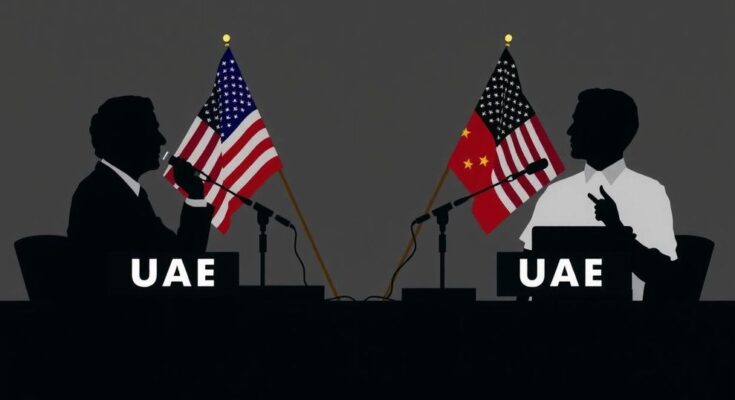Recent U.S.-UAE talks unexpectedly centered on Sudan, focusing on solutions to the ongoing conflict rather than previously anticipated global issues. Political analyst Mohamed Hereika noted the significance of the UAE being designated a major defense partner by the U.S. and emphasized the urgent need for diplomatic resolutions to restore civilian governance in Sudan amid rising tensions between factions and accusations of interference by the UAE.
In recent discussions between United States officials and the United Arab Emirates, the focus has unexpectedly shifted towards Sudan, as emphasized by political analyst Mohamed Hereika. The dialogues, featuring President Joe Biden and Vice President Kamala Harris alongside UAE President Mohammed bin Zayed, notably concentrated on Sudan rather than the anticipated topics, such as the ongoing Russia-Ukraine war or the conflict in Gaza. Hereika highlighted the importance of the U.S. officially recognizing the UAE as a “major defense partner” during their interaction. Both parties acknowledged a mutual stance regarding the Sudan crisis, particularly regarding the lack of a military solution and the urgent need for measures to cease hostilities and reinstate civilian governance. Despite increasing tensions between certain Sudanese factions and the UAE, alignments on addressing the Sudanese issues were marked, with the UAE advocating for a peaceful resolution, particularly concerning Sudanese refugees in Chad. In discussions, Hereika referenced a circulating video portraying a refugee beseeching the UAE to halt its support for the paramilitary forces identified as the Rapid Support Forces (RSF). He expressed surprise at the UAE’s sustained diplomatic relations with Sudan amid rising allegations of their involvement with the RSF. Furthermore, despite warnings issued by international entities regarding regional meddling, no direct accusations had been levied against the UAE. Amidst reports from reputable sources such as the New York Times speculating on the UAE’s backing of RSF, Hereika remarked on the UAE’s declared position as a U.S. defense partner amplifying its influence within the region. However, he raised concerns regarding the UAE’s capacity to serve as a mediator in Sudan’s current conflict, particularly highlighting claims from the Sudanese Armed Forces which affected their participation in recent Geneva negotiations. Emphasizing the essential nature of dialogue, Hereika asserted, “All wars eventually end at the negotiating table,” underscoring the necessity for political efforts to avert a deepening humanitarian situation. Both the U.S. and the UAE reaffirmed their dedication to advancing a peaceful resolution in Sudan.
The recent U.S.-UAE discussions have taken an unexpected direction, centering the focus on Sudan amidst various pressing global issues. This signifies a notable shift in diplomatic priorities and underlines the strategic interests of both nations in the region, especially regarding stability and conflict resolution in Sudan. The backdrop of these talks reflects ongoing crises, including military confrontations and humanitarian issues that have marked Sudan for years. The U.S. designation of the UAE as a major defense partner indicates a strengthening of ties and shared objectives in addressing conflicts that pose risks to regional security.
In conclusion, the recent meetings between American and Emirati leaders underscore a pivotal shift towards addressing the Sudanese conflict within global diplomatic dialogues. Political analyst Mohamed Hereika articulated the necessity to prioritize peaceful resolutions over military actions and highlighted the complexities of the UAE’s involvement. The commitment of both nations to halt the violence in Sudan and their advocacy for a return to civilian governance reflect a broader strategy aimed at stabilizing the region amidst challenging circumstances.
Original Source: www.dabangasudan.org




